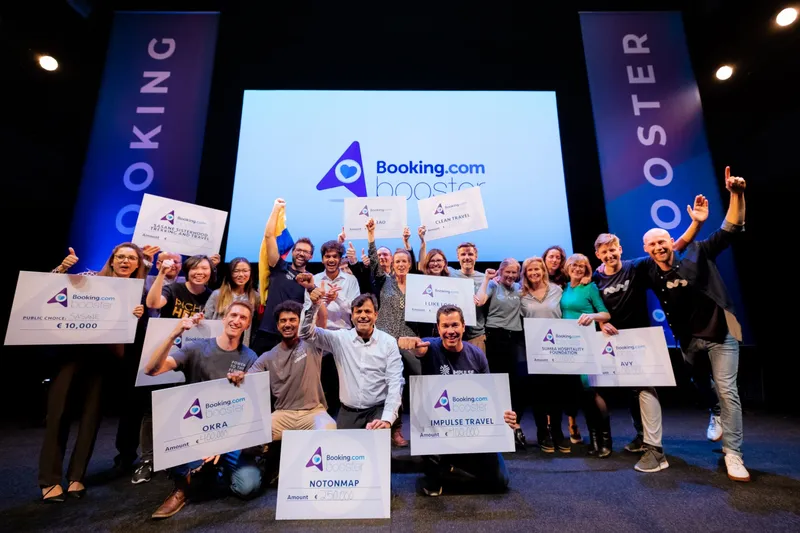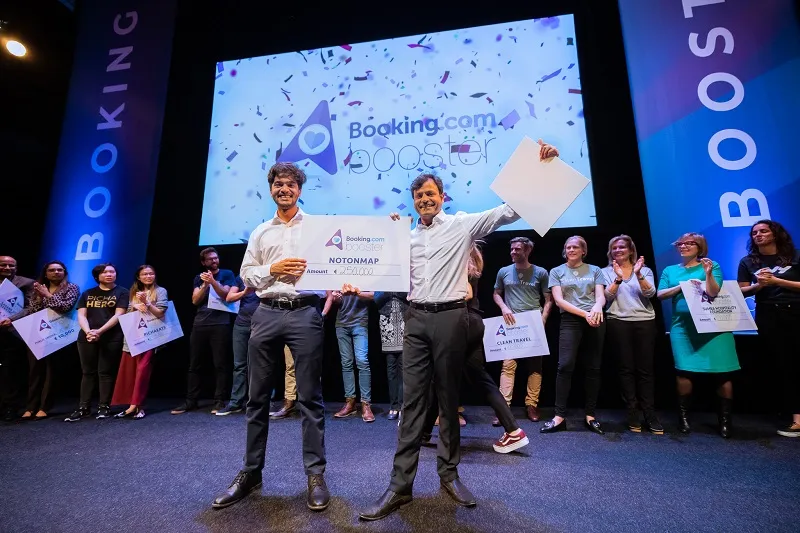Meet the 10 startups that are working on sustainable tourism, and won Booking.com grants
Himachal startup NotOnMap, which creates a livelihood for marginalised people in rural areas by preserving their culture and heritage, is among the 10 startups to have won a grant from zero-equity accelerator programme Booking Booster.

A sustainable tourism startup based out of Himachal Pradesh is among the 10 startups to have been recognised by online travel platform Booking.com this year. NotOnMap, the only Indian startup among the 10, won 250,000 euros from Booking Booster, a zero-equity accelerator programme.
A total of two million euros was presented between the 10 startups, with the maximum amount being 5,00,000 euros in one grant. The third annual edition of the programme held its finale in Amsterdam on Thursday (May 9), and the awardees were presented with the cheques. (For the first time, the programme gave grants to all 10 startups.)
Here's a closer look at the 10 winners:
1. Founded in Netherlands and focusing on Africa, AVY uses drones to deliver medicines in remote locations as well as protect wildlife. Their drones have vertical take-off and landing (VTOL) capability and infra-red camera to monitor animal population (to protect them against poachers). AVY won 200,000 euros from Booking Booster.
2. Clean Travel, based in Australia, provides software to help local travel operators in the sustainable travel space manage their business. It also facilitates integration with major global online travel marketplaces for them. Additionally, it has ecommerce solutions for operators who provide retail services. It won 100,000 euros at the programme.
3. Hydrao is the world first smart-shower, which shows the user the amount of water used in showering on real time. Tourist destinations often face water scarcity as travellers tend to use twice the amount of water they use at home. The French startup’s showerheads help reduce customers’ water wastage. It was awarded 100,000 euros at the event.
4. I Like Local, founded in Netherlands, is an online travel marketplace that connects travellers with local people in developing countries. Focused on Kenya now, it aims to provide authentic experiences to travellers and an extra source of income to local hosts. With every booking, a local host earns up to $70. It was presented with 100,000 euros.
5. Impulse Travel from Colombia is a ‘regenerative tourism’ platform for in-destination experiences, and aims to make tourism the top driver for development in the post-war country. By involving local peace leaders and communities to keep destinations safe, it helps them participate in the tourism industry in a sustainable way. The startup won 400,000 euros from Booking Booster.
6. Indian startup NotOnMap creates a livelihood for marginalised people in rural areas by preserving their culture and heritage. It restores traditional houses in unknown destinations, and creates self-help groups (SHG), as well as trains villagers in rural areas for cultural exchange, so that travellers build a real connection. It was awarded 250,000 euros at the programme.
7. Okra Solar is an Australian startup that uses solar energy (by using plug and play micro grid) to provide affordable energy access for rural households. Enabled with electricity, these off-grid communities can cater to travellers who want to go to off-beat places. The startup’s current focus is on Cambodia. The team won 400,000 euros at Booking Booster.
8. PichaEats empowers refugees in Malaysia to share home-cooked traditional food from their homeland with the native population. It purchases food, and repackages and resells in catering and meal box deliveries to consumers. It also conducts open houses at the refugees’ homes so people get a new experience. The startup won $175,000.
9. Nepal-based startup SASANE Sisterhood Trekking and Travel trains women, who are survivors of human trafficking, in trekking. It also trains them to become tour guides in rural mountain villages. By empowering these girls economically, the startup reduces the risk of commercial sexual exploitation and early marriages. It won 175,000 euros and the popular choice award.
10. Sumba Hospitality Foundation from Indonesia combines hotel management school for underprivileged youth with a luxury eco-resort. The students are subsidised by donations and revenue from the resort, which is built in bamboo, uses solar panels, and grow organic food on its permaculture farm. It was awarded 100,000 euros.

NotOnMap team at the Booking Booster event on Thursday in Amsterdam.
The programme received applications from 30 countries; of these, 10 startups made it to the final round. Two individuals from each startup were given three weeks of training and mentoring by experts at Booking.com, on startup growth, impact measurement, pitching, and sustainable tourism. The startups were judged by the top leadership of Booking.com on the investor deck (80 percent) and the pitch(20 percent).
The startups get access to the alumni network and experts associated with Booking Booster. A dedicated Booking.com mentor, and a pool of experts, will support these startups in execution even afterwards. They also keep a track on the impact made by these startups. Booking Booster is part of the company’s CSR programme, Booking Cares.
Last year, Delhi-based Global Himalayan Expedition (GHE), founded by Paras Loomba and Jaideep Bansal, won the highest grant (of 400,000 euros) at Booking Booster. The duo hosted the event yesterday. Gillian Tans, CEO of Booking.com and Livia Firth, creative director at Eco-Age were among the speakers.
Why agri and eco-tourism have become popular with city dwellers and busy professionals







